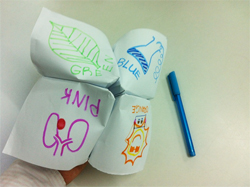In his latest blog post, English teacher Adam Lewis describes an innovative yet stunningly simple method students can use to ensure they are improving in the actual areas where they need to improve. The so-called 'scaffolds' that Adam writes about are the tools a student may or may not need to answer a question and can 'bet' on, such as working with a partner, but there's a catch - each scaffold is 'priced' accordingly to how objectively useful it is and, if chosen, will cost the student marks at the end of their answer. We think it's an ingenious method for students to help them discover their own individual strengths and weaknesses, and we encourage you to read Adam's post in full below.

I'm afraid I do like a flutter but, as a teacher, I can't afford to spend more than a few pennies (literally) each week. I decided to introduce this idea to the classroom. I've only used this in my Year 12 English Language class but I expect it could be easily applied to most classes and would result in interesting conversations in most contexts.
It allowed my Year 12 class, who have target grades from A-D, to choose the differentiation they required. Each scaffold was given 'a mark'. These scaffolds included being given the mark scheme, getting examiner comments about successful responses and working in a pair. There were about ten different scaffolds available and each scaffold would cost the students marks in their final mark for the question from 2 marks for the least useful scaffold to 20 marks for the most useful.

I thought I would revisit Wikispaces with my Year 9 class this week. We have internal examinations next week so it was a revision lesson on Unit 1 AQA GCSE Physics. I thought, wouldn’t it be good to set up a wiki of revision notes in an hour? I set up a page for each section of the specification, which corresponded to a double page spread in their text book. I made the wiki publically editable to save them having to join up and be approved.
Each student was allocated a section of the text book on which to make summary notes, add images and weblinks to further resources, all of which I explained how to do (5 minutes).

I tried this out today with a Year 7 group of students. I am sure you remember using one of these when you were at school to predict who would be your next girlfriend or boyfriend! Here is a giant one some students made today.
Instead of predicting your future love interest, we replaced the names with science revision questions, then each student tested each other using the fortune tellers.

Every year group for the next few weeks will be completing end of year exams in all subjects here at the International School. I have been exploring with a group of students how they revise. We then discussed how teachers and our parents support us to revise. As a result, we have produced a document below which we have made available to all students across the school.
There are so many different ways of revising. The default technique, that most students adopt, is one of just reading their notes. This is a good starting point, but is not necessarily effective as it isn’t active. It does work for the small minority of people who have a photographic memory, but most of us are not that lucky!

Over the past month, my GCSE PE class have been involved in directed revision classes for their forthcoming exam.
I wanted to do something that freshened this up and caught the students off guard, taking them way out of their comfort zone. I had decided on my drive into school this morning that I was going to trial a student led revision lesson that involved the students presenting different areas of the syllabus to the whole group. I wanted to make it similar to a TeachMeet event, having presentations strictly timed, hence the name 'TeachMe'.
Students were told that they would be selected randomly via my name selector on the interactive whiteboard and that they would have exactly 3 minutes to present to the group, with a clock counting down on the whiteboard behind them. Each student, once selected, had to come out to the front of the class, pick a topic from the Wonderwall of topics and then deliver it.

A community-driven platform for showcasing the latest innovations and voices in schools
Pioneer House
North Road
Ellesmere Port
CH65 1AD
United Kingdom